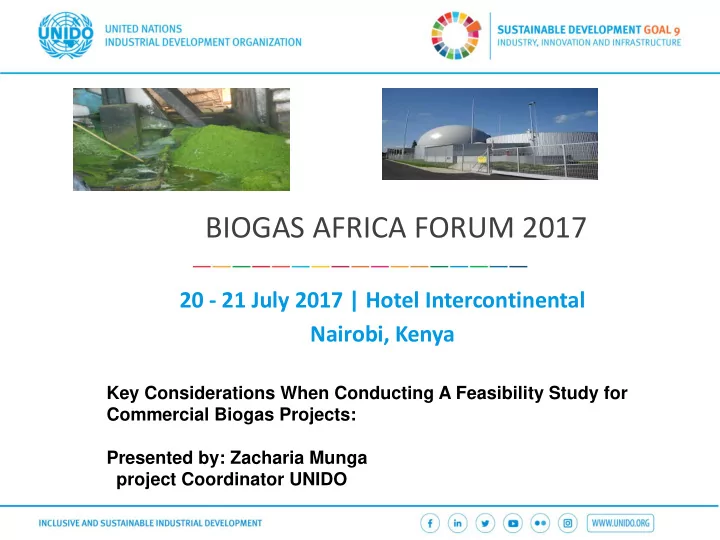

BIOGAS AFRICA FORUM 2017 20 - 21 July 2017 | Hotel Intercontinental Nairobi, Kenya Key Considerations When Conducting A Feasibility Study for Commercial Biogas Projects: Presented by: Zacharia Munga project Coordinator UNIDO
UNIDO’s Mandate: Inclusive & Sustainable Industrial Development (ISID) UNIDO Energy Programme: Promoting sustainable energy solutions for productive capacities, industrial competitiveness and job creation . 2
WTE Project : Title: Sustainable Conversion of Waste to Clean Energy for Greenhouse Gas Emissions Reduction Project Objective: To promote investments in waste-to-energy (WTE) to increase electrification and to reduce GHG emissions 3
Project Framework Project Component 1. Capacity development and knowledge management 2. Establishment of pilot agro-industrial WTE plants 3. Scaling up investment in WTE plants 4. Monitoring and Evaluation (M&E) 4
Key Considerations When Conducting A Feasibility Study for Commercial Biogas Projects • What is feasibility studies? This is preliminary study undertaken in order to determine the success of the biogas project. Is the analysis of the viability of the project idea and answers the question of whether one should proceed with the proposed idea. Pre-feasibility Study. May be conducted to help sort out preliminary information and alternatives. This saves more money by doing less evaluations during the comprehensive and costly FS. 5
Key Consideration in FS 1. Types and quantities of substrates available. 2. The amount of gas (biomethane) that can be produced. 3. Type of energy required and the quantities (Electrical/ Thermal). 4. Is the energy for own use or commercial. 5. Any pre-treatment required for feedstock. 6. Capacity/type of the digestor/equipment required and cost. 7. The volumes of bio-slurry and it handling. 8. Cleaning of the methane gas. 7. Existing policies, regulations and laws. 6
Cont’d 8. FIT, levies and taxes. 9. Energy cost compared to existing alternatives. 9. Energy off-take. 10. Environment/social impacts consideration. 11. Investment cost and revenues. 12. Economic Indicators. (IRR, NPV, Payback period) 7
THANK YOU Zacharia Munga UNIDO. WWW.unido.org. z.munga@unido>org 8
Recommend
More recommend